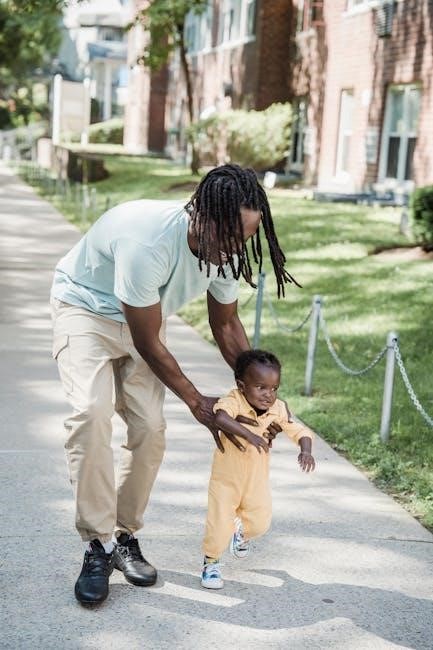
Sleepaway camps provide a nurturing residential summer experience for children, promoting skill development, independence, and social growth through diverse activities in a supportive community setting․
What is a Sleepaway Camp?
A sleepaway camp is a residential summer program where children and teenagers stay overnight for a period ranging from a few days to several weeks․ These camps offer a variety of activities, such as outdoor adventures, arts, sports, and team-building exercises, designed to foster personal growth and skill development․ Unlike day camps, sleepaway camps provide a unique opportunity for children to live in a communal setting, often in cabins or tents, under the supervision of trained staff; The camp environment encourages independence, resilience, and camaraderie, while also promoting physical and emotional well-being․ Sleepaway camps are typically held during school breaks and cater to diverse interests, making them a popular choice for families seeking engaging and enriching experiences for their children․
Benefits of Sleepaway Camps for Children
Sleepaway camps offer numerous benefits for children, fostering independence, confidence, and self-reliance․ Being away from home encourages children to step out of their comfort zones, developing resilience and problem-solving skills․ These camps provide opportunities to make lifelong friends, enhancing social and communication skills through shared experiences․ Immersed in nature and diverse activities, children often gain a deeper appreciation for the outdoors and develop a sense of responsibility․ The structured yet supportive environment of sleepaway camps allows children to try new things, build teamwork abilities, and explore their passions․ Overall, sleepaway camps are a transformative experience that helps children grow emotionally, socially, and intellectually, preparing them for future challenges and fostering a sense of adventure and curiosity․
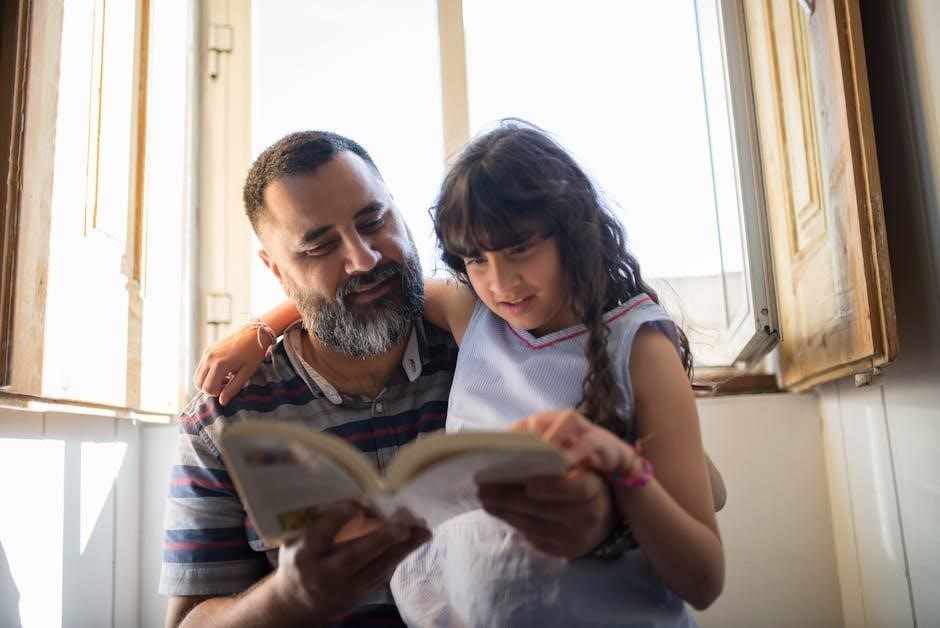
Safety and Security at Camp
Sleepaway camps prioritize camper safety with trained staff, clear emergency protocols, and 24/7 supervision, ensuring a secure environment for children to thrive and learn․
Staff Qualifications and Training
Camp staff undergo rigorous background checks, certifications, and extensive training to ensure they are equipped to provide a safe and supportive environment for campers․ Many counselors and leaders are professionals in education, childcare, or related fields․ Training covers first aid, CPR, emergency response, and conflict resolution․ Additionally, staff learn how to manage homesickness, promote inclusivity, and foster social skills among campers․ Some camps also provide specialized training for handling children with specific needs or allergies․ The goal is to create a team of compassionate, skilled, and prepared individuals who can guide campers in achieving personal growth and enjoying their camp experience․
Emergency Procedures and Protocols
Sleepaway camps have well-defined emergency procedures to ensure camper safety and quick response․ These protocols cover medical emergencies, natural disasters, and other unforeseen situations․ Camps conduct regular drills, such as fire evacuations and missing camper procedures, to prepare staff and campers․ A dedicated team is trained to handle crises, and emergency contact systems are in place to keep parents informed; First aid stations are fully equipped, and staff are certified in CPR and injury management․ Camps also maintain relationships with nearby medical facilities for advanced care․ Parents receive detailed information on emergency plans during orientation, ensuring transparency and preparedness․ These measures help create a secure environment, allowing campers to thrive while minimizing risks․
Camper to Staff Ratio and Supervision
A key factor in ensuring a safe and supportive camp environment is the camper-to-staff ratio․ Most sleepaway camps maintain a low ratio, typically ranging from 1:3 to 1:6, depending on the campers’ ages and activity types․ This ensures personalized attention and effective supervision․ Staff members are trained to monitor campers during all activities, including meals, outdoor adventures, and free time․ Many camps employ senior staff or counselors who specialize in supervision to maintain order and safety․ Regular checks and headcounts are conducted to ensure no camper is left unattended․ Parents are encouraged to inquire about the camp’s supervision policies during visits or orientations to gain peace of mind․ Proper supervision fosters a secure and enjoyable experience for all campers․

Communication with the Camp
Effective communication with the camp ensures parents stay informed about their child’s experience through regular updates, letters, and access to camp directors for any concerns or questions․
How to Stay in Touch with Your Child
Staying in touch with your child at sleepaway camp can be done through letters, emails, or care packages, allowing them to feel supported while maintaining independence․ Many camps offer scheduled call days or video chats, ensuring consistent communication․ Additionally, camps often provide regular updates through newsletters or photo uploads, keeping parents informed․ Some camps use digital platforms for sharing daily highlights, giving families a glimpse into camp life․ It’s important to balance communication to avoid overwhelming your child, allowing them to fully engage in camp activities․ Encourage your child to write letters or postcards, fostering a sense of connection without undermining their growth․ By staying engaged yet respectful of their experience, you support their development and enjoyment of camp life․
Regular Updates from the Camp
Camps typically provide regular updates to keep parents informed about their child’s experience․ These updates may include daily or weekly newsletters, highlighting activities, events, and camper achievements․ Many camps use online platforms or apps to share photos, videos, and summaries of daily routines․ Some offer live webcams or virtual updates, allowing parents to glimpse camp life․ Additionally, camps often designate specific times for phone calls or video chats, ensuring direct communication․ These updates not only reassure parents but also help them feel connected to their child’s journey․ By staying informed through these channels, parents can better understand and support their child’s growth during their time at camp․ Regular updates are a key part of fostering trust and confidence in the camp experience․
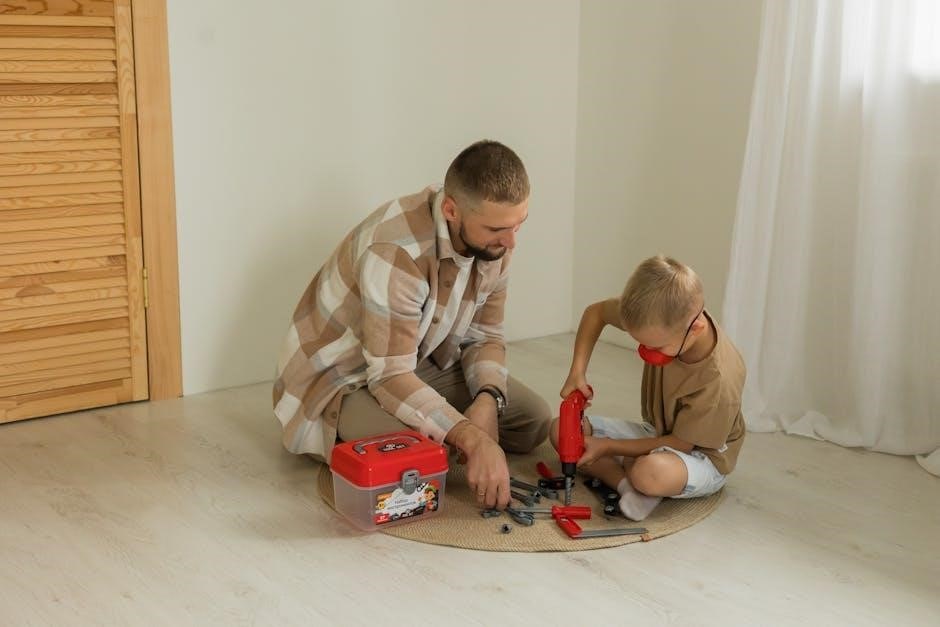
Preparing Your Child for Camp
Prepare your child emotionally by discussing camp activities and reassuring them․ Encourage open communication to address any fears, fostering excitement and readiness for the experience․
Emotional Preparation and Support
Emotional preparation is crucial for a smooth transition to camp․ Encourage open conversations about camp life, addressing fears and building excitement․ Role-play scenarios like meeting new friends or following routines can ease anxiety․ Share stories of positive camp experiences to foster enthusiasm․ Reassure your child that it’s okay to feel homesick and that staff are trained to support them․ Discuss the importance of trying new activities and stepping out of their comfort zone․ Remind them that camp is a safe space for growth and friendship․ Consider including a comfort item, like a favorite toy or letter, to provide reassurance․ By fostering resilience and confidence, you help your child embrace the camp experience wholeheartedly․
Packing Essentials and Checklist
Packing the right items ensures your child’s comfort and enjoyment at camp․ Start with sturdy luggage and a detailed checklist․ Include seasonal clothing, swimwear, and layers for varying weather․ Don’t forget toiletries like toothbrushes, toothpaste, and shampoo․ Pack bedding essentials if required, along with a sleeping bag․ Add extra socks and underwear for convenience․ Include a water bottle, sunscreen, and insect repellent for outdoor activities․ A flashlight, first-aid kit, and reusable utensils are practical additions․ Label all items with your child’s name to prevent loss․ Consider including a comfort item, like a favorite toy or letter, for reassurance․ Check the camp’s packing list for specific requirements and avoid prohibited items․ Ensure everything is weather-appropriate and durable for camp adventures․ Proper preparation helps your child feel ready and confident for their time away․

Health and Well-being
Camps prioritize health with qualified medical staff, emergency procedures, and hygiene practices to ensure a safe environment for all campers․
Medical Facilities and Staff Availability
Sleepaway camps typically have on-site medical facilities equipped to handle minor injuries and illnesses․ Many employ licensed nurses or doctors who are trained in emergency care․ Camps ensure that medical staff are available 24/7 to address camper needs, from administering medications to treating injuries․ In case of serious medical emergencies, camps have protocols in place for quick transportation to nearby hospitals․ Parents are usually required to provide detailed medical histories to ensure proper care․ Camps also maintain communication with parents regarding their child’s health, ensuring transparency and peace of mind․ The presence of qualified medical staff and well-equipped facilities ensures a safe and healthy environment for all campers․
Handling Special Dietary Needs
Sleepaway camps are well-equipped to accommodate children with special dietary needs, ensuring their health and well-being․ Many camps offer customizable meal plans to cater to allergies, intolerances, or preferences, such as gluten-free, nut-free, or kosher options․ Parents are encouraged to communicate their child’s specific requirements during registration, allowing the camp to prepare accordingly․ Camps often have experienced chefs and staff trained to handle dietary restrictions, ensuring meals are both safe and enjoyable․ Additionally, camps may involve parents in meal planning to guarantee their child’s needs are met․ Clear communication and collaboration between families and camp staff ensure that every camper has access to nutritious and appropriate food throughout their stay․ This attention to detail helps create a worry-free experience for parents and a positive dining experience for children․
Hygiene Practices at Camp
Sleepaway camps prioritize hygiene to ensure a healthy environment for all campers․ Handwashing stations are readily available, and campers are encouraged to wash their hands frequently, especially before meals and after using the restroom․ Bathrooms are cleaned regularly, and proper sanitation practices are maintained throughout the camp․ Laundry facilities are accessible for campers to keep their clothing and bedding clean․ Trash and recyclables are disposed of properly to maintain a clean and pest-free environment․ Staff are trained in hygiene protocols, and campers are educated on the importance of personal hygiene to promote overall health and well-being․ These practices help create a safe and comfortable setting for everyone at camp․
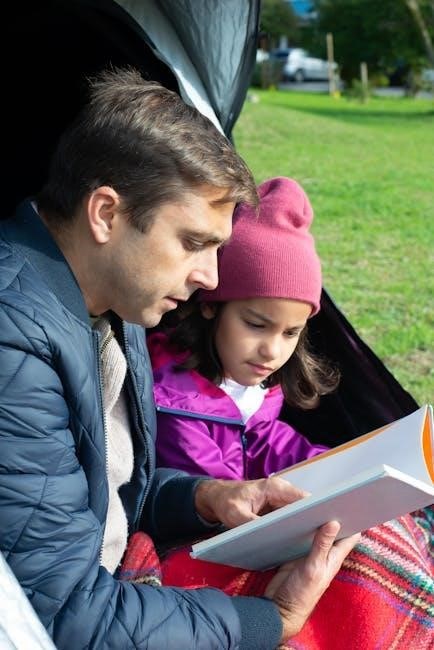
Managing Homesickness
Homesickness is common but manageable․ Parents can help by discussing expectations beforehand, encouraging open communication, and reassuring their child of their support and love from home․
Strategies for Parents
Parents can play a crucial role in helping their child manage homesickness by fostering open communication and emotional support․ Encourage your child to express their feelings before camp and reassure them that it’s okay to feel homesick․ Establish a plan for staying in touch, such as letters or scheduled calls, to provide comfort without creating dependency․ Focus on the positive aspects of camp, like new friendships and exciting activities, to build excitement․ Avoid making promises about picking them up early, as this can worsen anxiety․ Instead, encourage your child to take small steps toward independence and remind them of their ability to handle challenges․ Your confidence in their resilience can greatly alleviate their concerns and help them thrive at camp․
Camp Initiatives to Reduce Homesickness
Camps often implement initiatives to help children adjust and reduce homesickness․ Many offer welcoming orientation programs to help campers feel comfortable and build connections early․ Trained staff are equipped to identify and support children who may be struggling, providing reassurance and guidance․ Activities are designed to foster teamwork and friendship, distracting from feelings of homesickness․ Some camps encourage letter-writing or provide scheduled call times to maintain a healthy connection with home․ Additionally, camps create a structured routine with engaging programs to keep campers focused on fun experiences․ These strategies aim to create a supportive environment where children can thrive and build confidence while being away from home․
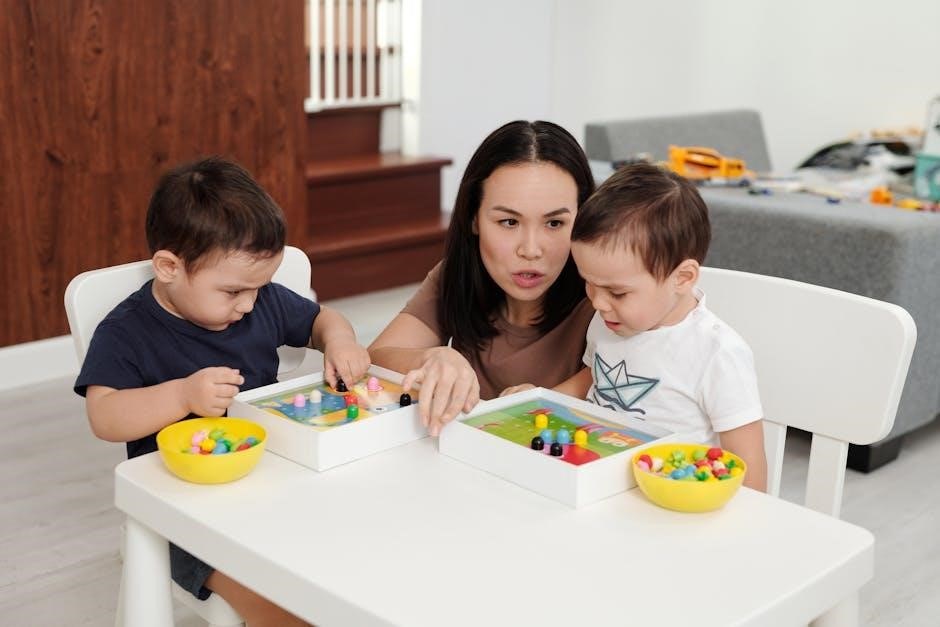
Camp Activities and Programs
Sleepaway camps offer diverse and engaging activities, including sports, arts, crafts, and outdoor adventures, designed to promote skill development, teamwork, and creativity in a fun environment․
Types of Activities Offered
Sleepaway camps provide a wide variety of activities designed to cater to different interests and ages․ Outdoor adventures such as hiking, camping, and kayaking are common, while sports like soccer, basketball, and archery encourage teamwork and physical fitness․ Arts and crafts sessions allow campers to express their creativity through painting, pottery, and jewelry-making․ Many camps also offer specialized programs like drama, music, or culinary arts․ Additionally, team-building exercises and scavenger hunts foster collaboration and problem-solving skills․ Evening activities often include campfires, stargazing, or talent shows, creating a sense of community and shared experiences․ These diverse offerings ensure campers can explore new passions, develop skills, and create lasting memories in a supportive environment․
skill Development Opportunities
Sleepaway camps offer a variety of skill development opportunities, fostering personal growth and confidence․ Campers can improve teamwork and leadership through group activities like sports and team-building exercises․ Many camps provide specialized programs such as archery, ropes courses, or STEM projects, enhancing focus and problem-solving abilities․ Arts and crafts sessions encourage creativity, while public speaking and drama classes help refine communication skills․ Water activities like swimming or kayaking promote physical fitness and safety awareness․ These experiences not only build new abilities but also prepare children for future challenges, teaching them resilience, adaptability, and collaboration․ The structured yet supportive environment of sleepaway camps ensures campers leave with improved skills and a stronger sense of self․

Cost and Financial Considerations
Sleepaway camp fees vary based on location, duration, and amenities․ Many camps offer scholarships, financial aid, or payment plans to make the experience accessible for families․
Understanding Camp Fees
Sleepaway camp fees cover accommodations, meals, activities, and staff costs․ Prices vary widely, from a few hundred to several thousand dollars per session, depending on the camp’s location, amenities, and program offerings․ Some camps offer tiered pricing based on family income, while others provide scholarships or financial aid․ Payment plans are often available to help families manage costs․ It’s important to review the fee structure and inquire about additional expenses, such as transportation or equipment․ Many camps also offer early bird discounts for those who register well in advance․ Parents should carefully compare camp fees and consider value for money to find the best fit for their budget and child’s needs․
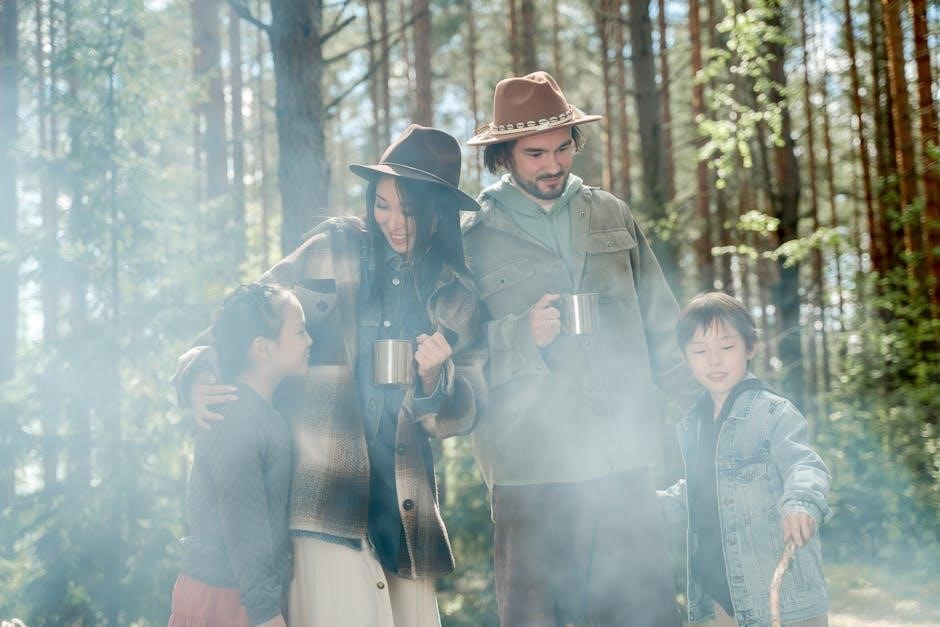
Scholarships and Financial Aid Options
Many sleepaway camps offer scholarships or financial aid to help families afford the experience․ These opportunities may be based on financial need, merit, or specific criteria such as first-time attendance․ Parents can explore camp websites, local organizations, or community groups for available scholarships․ Some camps also partner with non-profits to provide funding for underprivileged children․ Additionally, sliding scale fees or tiered pricing models are common, allowing families to pay based on their income level․ To apply, parents typically need to submit proof of income, tax documents, or letters of recommendation․ Reaching out directly to camp directors can also uncover additional assistance options, ensuring more children can benefit from the camp experience․
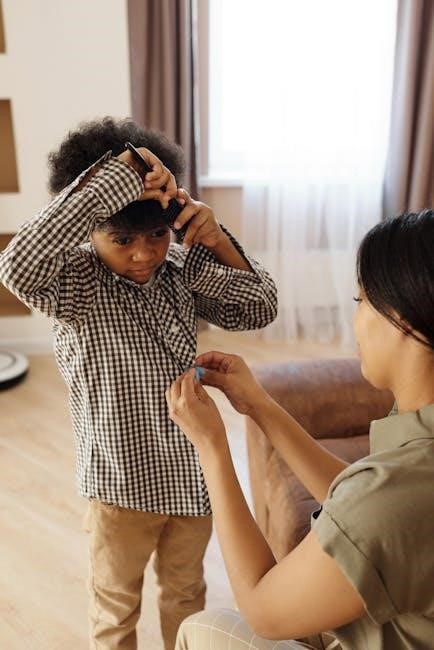
Selecting the Right Camp
Choosing the right sleepaway camp involves considering your child’s interests, skills, and personality, while evaluating camp offerings, settings, and reputations to ensure the best fit․
Factors to Consider
When selecting a sleepaway camp, parents should evaluate factors such as the camp’s location, facilities, and programs to ensure they align with their child’s interests and needs․ Consider the camp’s philosophy, values, and safety record, as well as staff qualifications and camper-to-staff ratios․ Consider the types of activities offered, such as sports, arts, or outdoor adventures, and whether they cater to your child’s preferences․ Read reviews and ask for references to assess the camp’s reputation․ Additionally, evaluate the camp’s communication policies, including how they keep parents informed and handle emergencies․ Finally, consider the camp’s policies on inclusivity, diversity, and special needs support to ensure it provides a welcoming environment for your child․ These factors help determine the best fit for your child’s unique needs and preferences․
Visiting the Camp Before Enrollment
Visiting a sleepaway camp before enrolling your child provides valuable insights into its daily operations and environment․ During the visit, observe the facilities, cleanliness, and safety measures․ Speak with camp directors and staff about their qualifications, experience, and camper-to-staff ratios․ Ask about their emergency procedures and communication policies․ Engage with current campers and parents to gain firsthand feedback and gauge the overall atmosphere․ Take note of the types of activities offered and whether they align with your child’s interests․ A tour allows you to assess whether the camp’s values and programs match your expectations, helping you make an informed decision for your child’s summer experience․ This step ensures confidence in choosing the right camp for your child’s growth and enjoyment․
Sleepaway camps offer transformative experiences, fostering independence, confidence, and lifelong friendships․ With proper preparation and research, parents can ensure a positive and enriching adventure for their children․
Final Thoughts for Parents
As your child embarks on their sleepaway camp journey, trust in the camp’s ability to nurture growth and independence․ Open communication with camp staff ensures a smooth experience․ Embrace this opportunity for your child to build resilience, form lasting friendships, and develop essential life skills․ While it’s natural to feel nostalgic, remember that camp fosters confidence and self-reliance; Encourage your child to step out of their comfort zone and embrace new experiences․ Trust the process, and celebrate the transformation you’ll see upon their return․ Sleepaway camp is not just a summer adventure—it’s a foundation for lifelong personal development and cherished memories․ Stay supportive, and let your child thrive in this enriching environment․
Encouraging a Positive Camp Experience